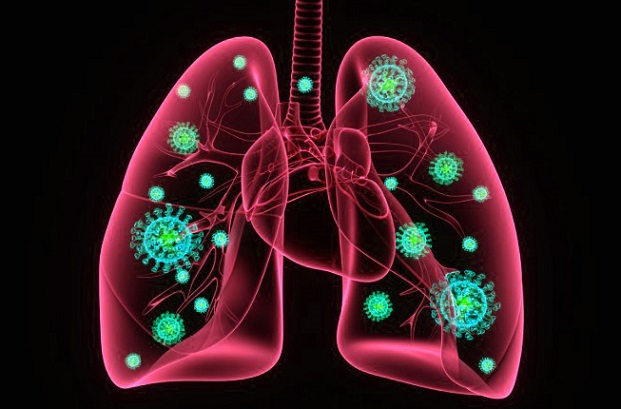Nikhil Prasad Fact checked by:Thailand Medical News Team Sep 09, 2025 5 months, 4 days, 20 hours, 1 minute ago
Medical News: New insights into how the virus harms the body
A new study by scientists from Johns Hopkins Bloomberg School of Public Health, Johns Hopkins School of Medicine, the National Institute on Aging, and the Johns Hopkins Outpatient Center has revealed that SARS-CoV-2, the virus that causes COVID-19, disrupts two vital systems inside human respiratory cells — the mitochondria, which supply energy, and the cytoskeleton, which gives the cells their shape and strength. This
Medical News report explains how these disruptions may help explain why COVID-19 often leads to more severe and longer-lasting symptoms compared to the seasonal flu.
 COVID-19 Infection Damages Energy Supply and Weakens Lung Cells
Comparing COVID-19 and influenza
COVID-19 Infection Damages Energy Supply and Weakens Lung Cells
Comparing COVID-19 and influenza
The researchers compared nasal and airway cells infected with SARS-CoV-2 and influenza A virus. While influenza A triggered rapid cell damage and death, SARS-CoV-2 showed a very different strategy. Instead of killing cells quickly, the virus caused subtle but significant changes in cell energy production and structure. This allowed the infected cells to survive longer but in a weakened state. The survival of these damaged cells may explain why some COVID-19 patients experience long-lasting health issues, often referred to as long COVID.
Mitochondria under attack
The team found that SARS-CoV-2 spike protein alone was enough to disrupt normal energy processes in the cell. Markers of healthy mitochondria such as SIRT3 and TOMM22 were reduced, leading to less oxygen use and increased acidity inside the cells. This shift forced the cells to rely more on less efficient energy production, weakening their ability to function.
Cytoskeletal remodeling and lung barrier damage
Alongside the energy disruption, the virus also altered the cytoskeleton — the inner framework of the cells. Levels of cofilin-1, a protein that helps maintain flexibility, dropped, while hardened actin filaments increased. This stiffening of the cells weakened the protective lung barrier, allowing for further injury and inflammation. Samples taken from the lungs of COVID-19 patients also showed the same abnormal buildup of actin, confirming the laboratory findings.
Why this matters
Together, these changes reveal that SARS-CoV-2 infection pushes cells into a survival mode. Instead of dying, the cells persist in a dysfunctional state, which could prolong viral infection and set the stage for chronic problems in the lungs. This is a key difference from influenza, which tends to destroy cells quickly without leaving behind this kind of lingering damage.
Conclusion
The study highlights that COVID-19 is not just another flu. By altering both energy supply and cell structure, SARS-CoV-2 creates a hidden weakness in the respiratory system that can last beyond the acute infection. These discoveries provide new clues as to why long COVID develops and why the virus has proven so dangerous. Understanding these processes c
ould guide the development of new therapies that protect mitochondria and stabilize lung cell structures. In the long run, such treatments may help reduce the severity and persistence of COVID-19 symptoms.
The study findings were published in the peer reviewed journal: mBio.
https://journals.asm.org/doi/10.1128/mbio.00820-23
For the latest COVID-19 News, keep on logging to Thailand
Medical News.
Read Also:
https://www.thailandmedical.news/news/sars-cov-2-3clpro-main-protease-s-role-in-cytoskeletal-dynamics-and-stealth-intercellular-infection
https://www.thailandmedical.news/news/swiss-doctors-warn-that-covid-19-can-cause-hypersomnia
https://www.thailandmedical.news/news/japanese-pediatricians-warn-that-sars-cov-2-can-cause-pulmonary-hypertension-in-children
https://www.thailandmedical.news/articles/coronavirus
